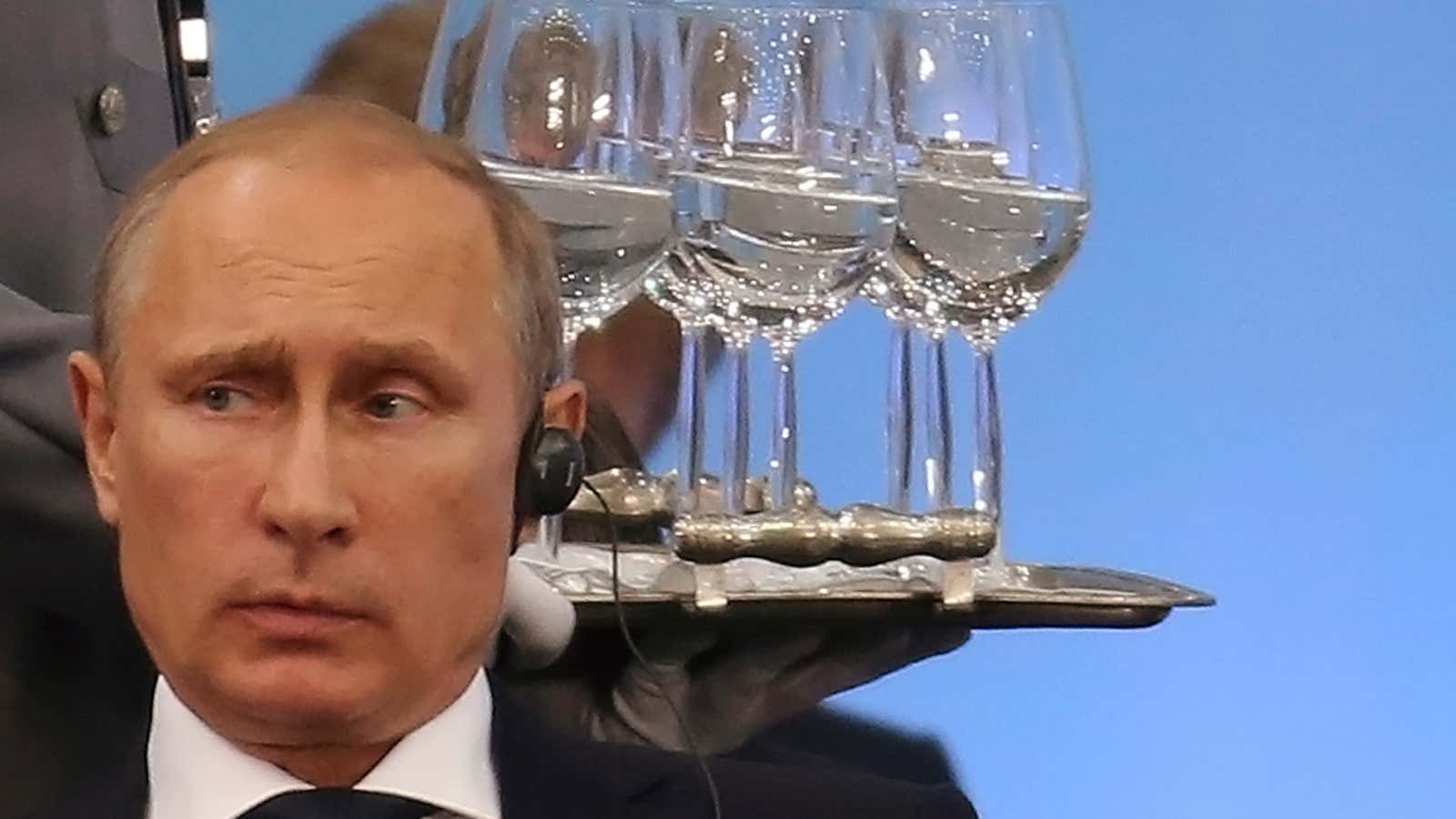Russian president Vladimir Putin has marched into a corner—having opted for war to halt Ukraine’s courtship with the West, he now faces international opprobrium and the probability of stinging new sanctions over the Malaysian Airlines crash.
While it is early and Putin may yet terminate his dual military and propaganda offensives against Ukraine and the West, the signs are by and large not of a man seeking a way out. Rather, Russia seems to be keeping to its pre-crash narrative.
Edward Lucas, of the Center for European Policy Analysis, suggests that the problem is the corner itself: even if he wanted to shift course, Putin has little room to maneuver after months of building a forceful domestic case—and his people into a frenzy—against outside enemies. He can’t back down from the brink, Lucas told Quartz in an email exchange. It would be “too humiliating now that he has demonized the West and Ukraine.”
If a Russian hand is proven, sanctions will become harsher
The tension with the West goes back to March, when Putin overran and absorbed Crimea and followed on by stealthily supporting an uprising across eastern Ukraine, which borders Russia. In recent days, the separatists forces shot down an An-26 transport jet and possibly a cargo plane belonging to Kiev.
The current crisis turns on whether these separatists are responsible for shooting down the Malaysian aircraft as well–or if there is an even more direct link to the Kremlin–as the US believes. If such links to Russia are established, Europe is likely to join the US in imposing harsher economic sanctions on Russia.
Already this week, the Obama administration placed tough new sanctions based on intelligence that Russia is heavily supporting the separatists by, among other things, allowing the shipment of men and materiel across its borders. On July 16, the US effectively locked four Russian companies out of the Western financial system. Europe followed with a milder round of new penalties. Mark Dubowitz, of the Foundation for the Defense of Democracies, suggested that is because the business lobbies of Germany and Italy–the biggest hurdles in enacting tougher European penalties–are “very strong and vehemently opposed to more sanctions.” Yet the crash could change the political landscape. “I wouldn’t underestimate the extent to which [chancellor Angela] Merkel may reach a point of no return where she gives up on Putin, as she eventually gave up on Iran, and agrees to tough new sanctions,” Dubowitz said. “Italy’s new prime minister may also surprise given his more Atlanticist leanings.”
Will Putin seek a way out?
Putin has suggested such new punishments would not change his behavior. He may be banking on Rosneft, Novatek, and the others finding loans in China or elsewhere to build out Russia’s next-generation oil and gas fields, needed to continue the country’s production of 10 million barrels of oil a day.
The state-controlled Russian media is so far supporting a status quo Ukrainian policy. Mainstream reports yesterday called the crash a Ukrainian conspiracy—either Kiev was trying to embarrass Moscow or outright assassinate Putin by shooting down his presidential plane. Some said the bodies of the victims were already dead when they fell from the sky, or were deliberately placed in the field to tar Russia. Such messaging was going over reasonably well with Muscovites.
Writing in the Financial Times, Swedish foreign minister Carl Bildt said that the local media and its “pro-separatist frenzy” are central to the problem. But more will come out challenging Putin’s view of the world, such as a report that separatists operating anti-aircraft weapons, including the type suspected of being used to down the airliner, were trained on Russian soil. Then there is this Ukrainian-released tape of separatists suggesting that an operating crew was provided with the BUK surface-to-air missile system that they obtained from Russia, and is suspected in taking down the airliner. And again, there are reports of a direct link to the Kremlin.
Given the shifting sands, Mark Galeotti, an expert on Russian security services at New York University, said that Putin may not be as locked in to his Ukraine policy as he might look—and that he has a record of changing his mind. He can back down “when he must and when he can,” Galeotti said in an e-mail exchange from Moscow, where he is on sabbatical. He cited Putin’s reversal in the case of blogger Alexei Navalny, who was imprisoned last year only to be almost immediately released. Such flip-flops, however, “go against the grain and, above all, he will need to be given or manufacture some face-saving formulation.” Galeotti said:
With Navalny, for example, it was the intercession of Moscow Mayor Sobyanin who wanted him to be allowed to compete (and lose) the mayoral elections. So Putin was the gracious and merciful tsar rewarding his loyal subject rather than a flipflopper. If he is willing to take it, MH17 actually offers him an exit ramp, as he can say that he is shocked, shocked to discover what kind of people the insurgents have proven to be and use that as the basis to detach himself.
Andrew Kuchins, a Russia expert at the Center on Strategic and International Studies, is not convinced that Putin can do much even if he decides he wants to–the situation may now be out of his complete control. “I am skeptical that he can control his side (of the border) to the extent that frankly we would be much more comfortable with,” Kuchins told Quartz. “He is responsible for sure, but there may likely be some unaccountable actors on his side of the border as well. Hard to turn these things off like a light switch.”




